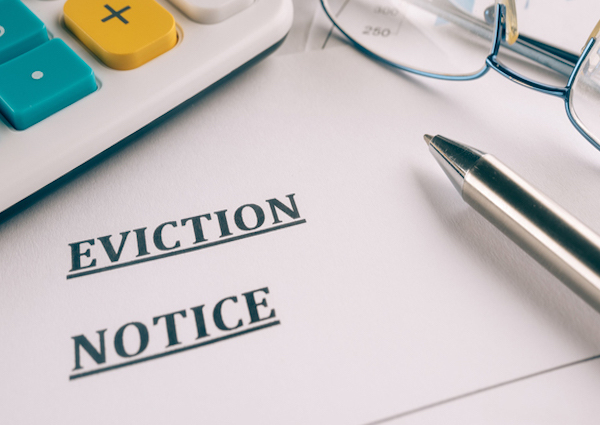
West Hollywood’s coronavirus eviction moratorium remains in effect until July 31, but the West Hollywood City Council unanimously approved updated guidelines connected to that moratorium during its Monday night meeting. Under the revised moratorium, evictions for non-payment of rent due to financial hardships related to COVID-19 are still banned, but evictions under certain other circumstances are allowed.
The Council made it clear the eviction moratorium is intended to protect people affected financially by the coronavirus pandemic, either through loss of work or reduction of hours, or people who have been unable to work due to contracting the coronavirus.
Keeping people from falling into homelessness during the pandemic is the Council’s main goal. Even before COVID-19, the Los Angeles region already had over 50,000 homeless people. That number could have increased exponentially with the coronavirus crisis if the various cities throughout Los Angeles County hadn’t issued eviction moratoriums.
The homeless population is at greater risk of contracting the coronavirus and of potentially spreading the virus as well. Thus, keeping people out of homelessness is a way to protect all residents from possible infection.
Although West Hollywood’s eviction moratorium expires on July 31, that date could be extended depending on how the pandemic develops in the next six weeks. If the date remains July 31, tenants who have been unable to pay rent will be expected to start paying again with August rent and then have one year to repay any back rent they owe.
The city is offering grants for residents who need money to pay rent. Corri Planck, the city’s acting director of human services and rent stabilization, reported that since the coronavirus local state of emergency was declared on March 16, the city has received 567 requests for rental assistance. Planck reported the city has paid $407,518 in those three months and therefore expects to pay almost $2 million in rental assistance by next March, one year into the coronavirus crisis.
While that sounds like a large amount, city officials have explained many times that it costs the city far less to help keep people in their apartments than it does to pay for the social services required once people fall into homelessness. The amount of money the city would pay in homeless services if there were mass evictions would far exceed $2 million.
The updated eviction moratorium does spell out the circumstances under which an eviction action can proceed right now:
- If a tenant cannot pay rent for financial hardship reasons NOT related to COVID-19.
- If a tenant is using a rental unit for an illegal purpose and does NOT correct the situation after receiving proper notice.
- If a tenant’s unit is dangerous and unsanitary and the tenant does NOT correct the situation after receiving proper notice.
- If a tenant poses an imminent and verifiable threat to the health of other tenants living in the unit or on the rental property.
However, even though the city allows those evictions to move forward now, the California court system is currently not processing any eviction actions, known officially as “Unlawful Detainers.” In April, the California Judicial Council approved coronavirus-related emergency rules saying the courts will not accept any Unlawful Detainers until 90 days after the declaration of a state of emergency expires. In early June, Gov. Gavin Newsom extended the statewide eviction moratorium to July 28. That means the courts will not begin accepting Unlawful Detainers until Oct. 27, unless Newsom extends the statewide moratorium again.
Meanwhile in Sacramento, the state Assembly is considering a bill that would bar landlords from evicting tenants for 90 days after the statewide moratorium is lifted. AB 1436 would also ban landlords from using unpaid rent during the pandemic as grounds for evictions in the future and allowing tenants 15 months rather than 12 months to repay any back rent.
The Apartment Association of Greater Los Angeles (AAGLA) opposed the city’s updated eviction moratorium. In a detailed letter to the Council, AAGLA argued “the proposal is overreaching the City’s authority and one we believe to be a violation of the property owner’s fifth amendment constitutional rights.” The U.S. Constitution’s Fifth Amendment states “private property shall not be taken for public use without just compensation.”
The AAGLA has also filed a lawsuit against the City of Los Angeles over its eviction moratorium. The Los Angeles eviction moratorium is ongoing and will only end when LA Mayor Eric Garcetti declares the local state of emergency over, something unlikely to happen anytime soon.

I read this article this afternoon and came across the four circumstances under which an eviction processing can occur right now.Wow, under these guidelines,Ed Buck could have been removed from his drug den of an apartment on three of the points made,even before the start of this COVID-19 pandemic. His landlord didn’t need to wait for law enforcement to take any action,he could have proceeded on a civil basis.
Great, just what we need–more people kicked out into the street during a pandemic and at the outset of the second great depression. Very cool!
using tax dollars……to pay people’s rent?
It’s a great idea! The pandemic could be suppressed if rent and mortgage payments were cancelled and people were paid to stay home. But I guess maintaining the illusion that money comes from a person’s boss is more important than public health!